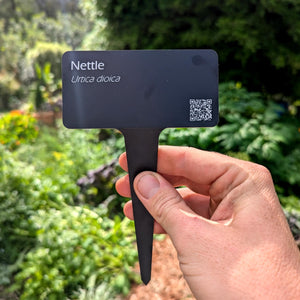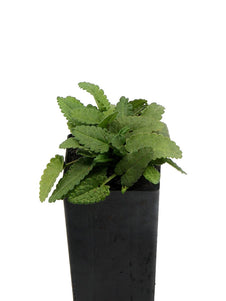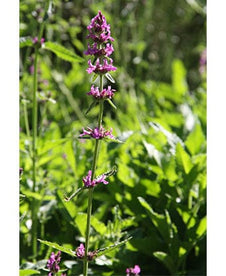



Betony
Betony

- Low stock - 13 items left
- Inventory on the way

Usually available: All year
Life cycle: Perennial
Height: 30 - 60cm
Position: Sun / part shade
Soil preference: Well drained
This is how we pack and send your Herb Plants to all states except TAS & WA
You will receive
- 1 Betony Herb Plant in a 50 X 75mm tube - General growing instructions
All of our Herb Plants are grown organically with certified organic potting mixes and fertilizers
Botanical Name: Betonica officinalis Syn. Stachys officinalis
Betony is a spreading perennial that may grow up to 1 meter in height, although it is often lower. The oblong leaves are hairy, rough textured and extend up from the roots, apparently without stalks. The dark green leaves are quite large at 5-12 cm long and up to 3 cm wide. The surface of the leaves is dotted with glands containing the bitter aromatic oils. The purplish, pink or white flowers appear in spring and summer on long lavender-like stems. The roots are thick and woody.
Betony is often called ‘wood betony’, in recognition of its preferred woodland habitat. This plant was originally known as Stachys betonica, before being reclassified to Stachys officinalis and the Betonica officinalis. There are other varieties of betony with similar characteristics. This variety was also called Bishopswort, for unknown reasons. The origin of the word betony is thought to be ‘bew’, the Celtic word for ‘head’ and the word ‘ton’ for ‘good’. Together they describe the herb as being ‘good for headaches’.
Wood betony was considered the most important medicinal herb for Anglo Saxons in early Medieval Europe. It was this reputation that inspired the saying, ‘sell your coat and buy betony’. In those days coats were very valuable, but betony was considered even more so! The Spanish also had a saying, ‘he has as many virtues as betony.’
Wood betony was also endowed with power against evil spirits, giving it a home in churchyards. It was often worn as an amulet or charm to offer personal protection. There were also superstitious claims that even the animals knew the wonders of betony. Stags wounded by arrows reputed to seek out betony, eating the herb and recovering fully form their injuries.
Growing Conditions
The natural habitat of betony is cool to temperate region woodlands including those in Europe, North Africa, western Asia and even areas of Great Britain and the Middle East. Wood betony in particular prefers to grow in woodland areas, at the edge of woods and nearby grasslands. It prefers full sun and an open position, and may be seen growing on road side verges.
Betony does very well in rich, humus reminiscent of its native habitat, but it will accept normal garden soil readily. The soil should be enriched and well watered to keep the soil evenly moist. It prefers a well-drained position and will respond poorly to humidity, damp and tropical conditions.
Propagation is usually by dividing existing clumps in mid-autumn or in spring, if you are in a colder area. Replant the smaller clumps with their own roots immediately.
To harvest your betony plant, cut the stems above the roots, tie together about six and hang up to dry in a cool, dry area. The dried leaves can be crumbled and kept in an air tight jar.
Culinary Uses
Betony does not have major culinary uses, but does have an intriguing taste that is described as warm, lingering and multifaceted.
Medicinal Uses
Betony was once revered as a medicinal herb and claimed to fix anywhere from 47 to 150 illnesses and ailments. However, it has slipped from this position into one of obscurity, even among many herbalists. It is uncertain whether this is due to a lack of knowledge or because it was simply over-rated in its beneficial effects. Today, betony is grown mainly as a garden border plant.
Traditional uses for betony included raising low spirits, enhancing melancholic disposition, poor liver function, circulation problems, joint pains and of course, headaches. Many people still claim it has benefits as a general tonic and headache remedy when made as a tea.
Wood betony has also been described, and used by Chinese herbalists, as a long acting tonic designed to improve overall health and to help the body heal itself. It is not intended to be used as a fast acting ‘fix-it’ herb, but works slowly over a long period of time. Perhaps this could contribute to the loss of recognition for betony in the modern world, where fast is best.
Generally, betony is said to be a warming and an uplifting tonic, suitable for improving general disposition and health. It is also known to work well in conjunction with other herbs, such as licorice, panax ginseng, hawthorn and withania.
Betony is known to interact with blood pressure medication and is best avoided if you have blood pressure problems.
All information provided on this website is for informational purposes only. Please seek professional advice before commencing any treatment.






